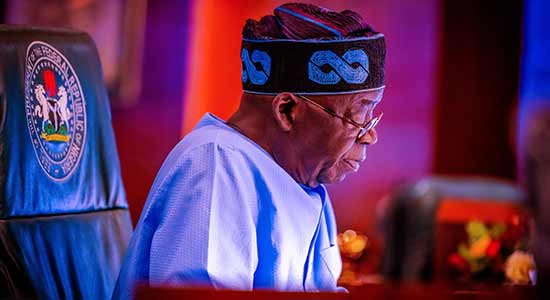Mixed reactions trail Tinubu’s approval of Oronsaye report implementation
A group of civil society organisations (CSOs) has urged the president to work with the National Assembly in the implementation of the report.

president bola tinubu
Mixed reactions have trailed President Bola Ahmed Tinubu’s Monday directive on the implementation of the Oronsaye report on civil service reforms with modifications on scraping, merging and subsuming of some government agencies to reduce costs of governance.
A group of civil society organisations (CSOs) has urged the president to work with the National Assembly in the implementation of the report.
This followed the views expressed by some analysts who felt the president ought to have worked with the National Assembly to get its nod before implementation.
However, in separate interviews with Daily Trust, three of the nation’s leading CSOs expressed some reservations about the modalities of the president’s action.
- Lassa fever: Minister confirms 6 deaths in Kaduna
- Introduce food stamp to end hunger, Senate tells FG
Speaking on the development, Malam Auwal Musa Rafsanjani, Executive Director, Civil Society Legislative Advocacy Centre (CISLAC) and Transparency International-Nigeria (TI-Nigeria) said the approval by President Tinubu for the implementation of the Oronsaye report was a welcome development, especially at this critical moment in Nigeria when there are unprecedented challenges facing the country on both socio-economic and political fronts which requires bold steps to address to reduce the cost of governance and ensuring efficiency and effective democratic governance outcomes.
“While we welcome and appreciate the approval by the president for the implementation of the report which significantly reduces the cost of governance, and harmonises the working of government agencies, we are greatly concerned that the president is taking these bold steps in a hasty manner without due consultation with the members of the National Assembly on the manner in which the agencies should be merged or scrapped.
“It is clear that some of these agencies were constitutional creations and some were of the National Assembly creation through a rigorous legislative debate which established the agencies thereby providing adequate constitutional and legislative backing in the form of laws made by the National Assembly.
“It is therefore fitting and more democratic for the president to follow the same procedure for the establishment of the agencies when merging or scrapping these agencies. This will provide more credibility to our constitutional democracy as due process is followed before any actual decision is taken by the president,” Rafsanjani said.
He said the emphasis for the president to work with the National Assembly is of great national significance as actions such as these require constitutional and legislative amendment which will establish legitimacy to the process and give room for due process and the rule of law as enshrined in the constitution to be adequately adhered to.
“The two months given by the president to fully implement the report does not provide an avenue for any legislative engagement and debates thereby establishing laws that will back the merging of the agencies through constitutional amendment.
“We call on the president to always take decisions according to the provisions of the rule of law and the Constitution of the Federal Republic of Nigeria. We notice that the president in many instances takes decisions without due consultation with the National Assembly which has serious democratic and governance ramifications.
“We urge the president to consider the legal and political consequences of taking such bold steps without due consultation with the body that constitutes laws backing the establishment of agencies without constitutional amendment,” Rafsanjani said.
Also, the Executive Director Resource Centre for Human Rights and Civic Education (CHRICED), Comrade Ibrahim M. Zikirullahi, said President Tinubu appears to be lacking clarity in his strategies for tackling the issues facing Nigeria.
He said despite having good intentions, without proper planning, positive results cannot be attained.
“Given his decision to implement the Oronsaye report, it would have been advisable for the president to present the report to the National Assembly for approval, in order to avoid any obstacles during the implementation process.
“Although it is widely known that the National Assembly often simply approves the president’s requests without scrutiny, it would still have been appropriate to involve them in the decision-making process,” Zikirullahi said.
On his part, Mr. Tunde Salman, the Team Lead/Convener, Good Governance Team (GGT) Nigeria, said the government needs to think through the policy and come out with implementation roadmap or strategies as many of such would require legislative actions.
